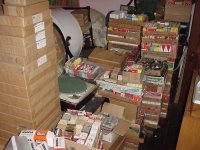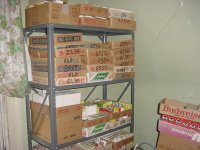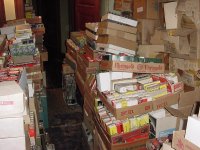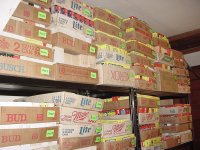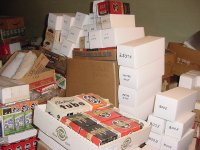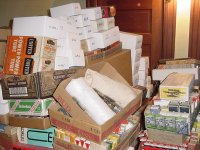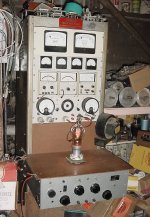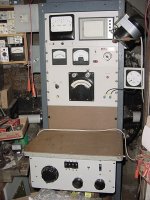Rollable tubes are the smooth round ones that easily roll of the table and break on the floor if you're not careful. But all seriousness aside, rolling tubes is the process of exchanging tubes in a given unit to listen for a difference in sound quality or performance. Some common numbers are available in different brands and/or styles. This gives you choices to experiment with. In the audio vernacular this is known as tube rolling.
Tube rolling is when you take tubes not being used that are of the same tube type (e.g. a Mullard EL34 with a new JJ EL34 tubes you just bought from one of the sponsors here) and swap them out. You can roll almost any tube and someone will be able to notice a difference from the rectifier tubes to the gain tubes like 12AX7.
This is mostly to test for difference in sound with respect to tone, clarity, range, or all of those. Does NOS Telefunkens sound better than the newly made Chinese tube? Or does a Chinese tube sound better with that Jazz CD versus the Czech tube?
If you have an amp (like the Mikael Abdellah SE amp) that can take different tubes of the same base, like EL34, 6550, KT88, KT66, or 6L6 tubes with the octal base, you can roll a pair of output tubes to see what sounds best to your ears.
That is tube rolling to me at least.
This is mostly to test for difference in sound with respect to tone, clarity, range, or all of those. Does NOS Telefunkens sound better than the newly made Chinese tube? Or does a Chinese tube sound better with that Jazz CD versus the Czech tube?
If you have an amp (like the Mikael Abdellah SE amp) that can take different tubes of the same base, like EL34, 6550, KT88, KT66, or 6L6 tubes with the octal base, you can roll a pair of output tubes to see what sounds best to your ears.
That is tube rolling to me at least.
Rollable tubes are the smooth round ones that easily roll of the table and break on the floor if you're not careful. But all seriousness aside, rolling tubes is the process of exchanging tubes in a given unit to listen for a difference in sound quality or performance. Some common numbers are available in different brands and/or styles. This gives you choices to experiment with. In the audio vernacular this is known as tube rolling.
HollowState, is right in a literal sense... However, HollowState, might I ask, just how many of those round tubes have you had roll off the table? I'd like to know if your score is higher than someone like tubelab George (I am only hypothesizing that George is the high score winner solely based on reading about the size of his collection).
In all seriousness, jwatts, search "tubelab" here on the site, or go to the vendor forum to tubelab, or outside to tubelab.com, and you will see what and how a true professional goes about tube rolling.
Last edited:
I actually haven't had too many roll off the table. At least not lately. But I've lost a couple of good ones. George seems to have a propensity for over powering and destroying tubes. Well, the cheap ones anyway. I went through that phase many years ago, learned a few things and then stopped. But I suspect George just has too much fun doing it. And I have a sizeable collection myself. A few in the attic, more elsewhere.However, HollowState, might I ask, just how many of those round tubes have you had roll off the table? I'd like to know if your score is higher than someone like tubelab George (I am only hypothesizing that George is the high score winner solely based on reading about the size of his collection).
Attachments
I actually haven't had too many roll off the table. At least not lately. But I've lost a couple of good ones. George seems to have a propensity for over powering and destroying tubes. Well, the cheap ones anyway. I went through that phase many years ago, learned a few things and then stopped. But I suspect George just has too much fun doing it. And I have a sizeable collection myself. A few in the attic, more elsewhere.
My friends think I'm crazy when I have couple of hundred of tubes at home but HollowState you make my collection more sane now 😀.
Anders
Wow, I'm debating what to be more impressed with, the number of tubes Hollowstate has or the amount of beer he consumed to get all of the boxes to store them 

HollowState couldn't choose a smiley but it's probably one of those:  😱 or maybe both. if you ever need to clean out your storage please think of us 😉
😱 or maybe both. if you ever need to clean out your storage please think of us 😉
 😱 or maybe both. if you ever need to clean out your storage please think of us 😉
😱 or maybe both. if you ever need to clean out your storage please think of us 😉Ha! I showed those pics to my wife and she can not complain now about my hobby. Thank you HollowState!
 Absolutely shameless HollowState...and I'll bet the pics only represent the a fraction of your affliction...
Absolutely shameless HollowState...and I'll bet the pics only represent the a fraction of your affliction...HollowState, since you are the most recent expert that has posted to this thread, back to rolling tubes...
Can you share with jwatts, just exactly how you roll tubes -- like any pointers you might have, what steps you might have (do you test them in a couple finely tuned vintage tube testers or use blind faith and drop them in or etc...), where you go to look for tubes, and how do you recommend on where to find as many tubes as you have?
This could be good...
Can you share with jwatts, just exactly how you roll tubes -- like any pointers you might have, what steps you might have (do you test them in a couple finely tuned vintage tube testers or use blind faith and drop them in or etc...), where you go to look for tubes, and how do you recommend on where to find as many tubes as you have?
This could be good...
I actually haven't had too many roll off the table. At least not lately. But I've lost a couple of good ones. George seems to have a propensity for over powering and destroying tubes. Well, the cheap ones anyway. I went through that phase many years ago, learned a few things and then stopped. But I suspect George just has too much fun doing it. And I have a sizeable collection myself. A few in the attic, more elsewhere.
hello ,
Waouw , big stock for long years 😉
You're very welcome. 😀 I do have the luxury of being single and own an eleven room house. So I can pretty much do what I want.Ha! I showed those pics to my wife and she can not complain now about my hobby. Thank you HollowState!
I don't do that much anymore. But as a long term member of the New Jersey Audio Society, I know people that do. And mostly small signal types in preamps or heahphone amps. You just have to stick with compatible types. Meaning a 12AX7 for a 12AX7 and a 6DJ8 for a 6DJ8. This includes equivalent industrial number types. Typical examples are 12AX7/7025/12AY7/ECC83. 12AU7/5963/5814/ECC82. 5687/7119/7044. 6DJ8/6922. NOS small tubes are used out of the box. Power tubes are always tested first.Can you share with jwatts, just exactly how you roll tubes...
where you go to look for tubes, and how do you recommend on where to find as many tubes as you have?
You should know that I was once in the surplus tube business years ago. Back then (the 80s) tubes were a lot easier to come by. Hamfest flea markets were a good source. I traveled up and down the East coast from Maine to North Carolina to attend them. And I'd meet people that had tubes at home and connected with them afterwards. Also word of mouth as a known buyer. I specialized more in transmitting and industrial types because they commanded more money. And what audio guys there were, didn't want them.
But today all that has changed. Everybody wants tubes, especially the popular audio numbers. This has made them harder to find. The internet, which didn't exist then, has help ruin things. (think eBay) And the Asians also gobbled up a lot of stock in the late 80's and 90's. What was plentiful then has virtually dried up now. In the early 90's I started saving many tubes I thought would be useful for making amplifiers.
Below are two units I built for testing large tubes. The first is a class A tester good for up to 1500 watts input. Gm is read by amplifing 1KHz. The other one is a pusle tester for tubes up to 20KW or more. It's really only limited by the filament transformer which is 12V at 200A. It charges up a big capacitor (2/100ufd photoflash in parallel) and discharges them through the tube configured as a diode. Tube current (peak amps) is read across a 0.1 ohm resistor at the bottom (ground) end of the capacitors. Readout is an ersatz sample and hold circuit. The monitor screen is for checking diodes and thyratrons by looking at the voltage break (knee).
Attachments
Last edited:
And yet again, HollowState manages to make me pick up my jaw up off the floor. You sir, deserve a prize for having 11 rooms of stuff.
Who cares what is in there, so long as one is a bed and the others have manly stuff that can kill you instantly with either fire or electricity (both of which you have managed to tame and bend to your will through years of experience), then you are doing okay. And you built those testing machines -- sir, I am just sitting here crying once more. (Hahaha! I just showed my wife (we both work from home) the testers you built, saying, "Those are handbuilt machines!" and her reply was, "Okay, so what? They are pretty.")
And, "NOS small tubes are used out of the box. Power tubes are always tested first." is something that I do too. Just figured they would do less damage upstream versus the big ones for output.
But back to the topic, are the hamfests a large thing down in the States? Up here in America's hat, the gatherings are pretty small (maybe half of a basketball court for the local ones and the larger ones are about an hour's drive away) and the pickings are either expensive or non-existent.
So as a supply source, would you trust eBay or which other stores have a good reputation? Like the Mouser or Digikey of NOS vacuum tubes? I have used TheTubeStore.com (they are a sponsor here at diyaudio.com) twice in the past without problem, but only for new manufactured tubes (no rolling, just to get a set of tubes).
Is it worth it to roll older NOS tubes at sometimes what becomes a much higher price? Or just roll the new manufactured tubes?
Who cares what is in there, so long as one is a bed and the others have manly stuff that can kill you instantly with either fire or electricity (both of which you have managed to tame and bend to your will through years of experience), then you are doing okay. And you built those testing machines -- sir, I am just sitting here crying once more. (Hahaha! I just showed my wife (we both work from home) the testers you built, saying, "Those are handbuilt machines!" and her reply was, "Okay, so what? They are pretty.")
And, "NOS small tubes are used out of the box. Power tubes are always tested first." is something that I do too. Just figured they would do less damage upstream versus the big ones for output.
But back to the topic, are the hamfests a large thing down in the States? Up here in America's hat, the gatherings are pretty small (maybe half of a basketball court for the local ones and the larger ones are about an hour's drive away) and the pickings are either expensive or non-existent.
So as a supply source, would you trust eBay or which other stores have a good reputation? Like the Mouser or Digikey of NOS vacuum tubes? I have used TheTubeStore.com (they are a sponsor here at diyaudio.com) twice in the past without problem, but only for new manufactured tubes (no rolling, just to get a set of tubes).
Is it worth it to roll older NOS tubes at sometimes what becomes a much higher price? Or just roll the new manufactured tubes?
Last edited:
just exactly how you roll tubes -- like any pointers you might have, what steps you might have
I might have engaged in this practice at one time or another. Tube rolling refers to the process of trying a bunch of similar tubes in a particular amp with all other variables kept the same, and the end user, with maybe his friends, or worse a whole room full of audiophiles. The purpose is to find out what is the "best" tube in that amp. It is hard to get a room full of audiophiles to agree on anything, and the power of suggestion is strong. Ideally the listeners do not know which tubes are being tested, and they shouldn't discuss the findings with each other.....good luck with that.
In theory all tubes with the same type number should sound the same, and a well designed amp should accomodate the minor differences between them. In the real world there are all sorts of things called 6L6GC that are nowhere near what RCA invented in 1939. So, tube rolling has some merit. Note that the tube that works in one amp with rock music might sound terrible in another amp with opera, so the amp, speakers, room, and music all must be similar or identical to the end situation, or the results are invalid.
Eight years ago I created the Tubelab SSE. It can run a bunch of different TYPES of output tubes, so the possibilities for rolling are numerous. So I gathered up a few friends who came with their favorite CD's, an amp, two sets of speakers, and a box full of tubes (see picture). As expected there was no clear cut winner amongst the tubes, but the common opinion was similar to mine. The JJ EL34 operating in triode mode with no feedback was the best performer for simple music like Norah Jones, and the KT88 in UL mode with cathode feedback worked best for loud rock like Pink Floyd and Metallica.
Note, The picture shows one corner of the warehouse 5 years ago. Each box is full of tubes, over 100,000 total. Since then we have eliminated the warehouse and it's rent payment. I am now down to about 5000 tubes which are all inside my house with about 2000 pounds of transformers......my wife calls me an addict!
Attachments
They used to be. But not so much as years ago. The ham radio hobby has changed considerably. Virtually no one builds radios or transmitters anymore. Almost all the old timers are gone. Today people just want to buy a "Tokyo rice burner" and talk to Europe tonight. All the USA hamfests have shrunk because of this and the internet.But back to the topic, are the hamfests a large thing down in the States?
After thirteen years of buying on eBay I have a good feel for the place. But I almost never buy tubes unless they are cheap and not audio numbers. Many sellers don't know enough about industrial tube to give an accurate description either. One on line seller with a very good reputation here is Jim McShane. And while I have never purchased anything from him, I've only heard/read good things, never bad.So as a supply source, would you trust eBay or which other stores have a good reputation?
Kinda looks like my garage. 😀Note, The picture shows one corner of the warehouse 5 years ago. Each box is full of tubes...
 😱
😱- Status
- Not open for further replies.
- Home
- Amplifiers
- Tubes / Valves
- Rollable Tubes
